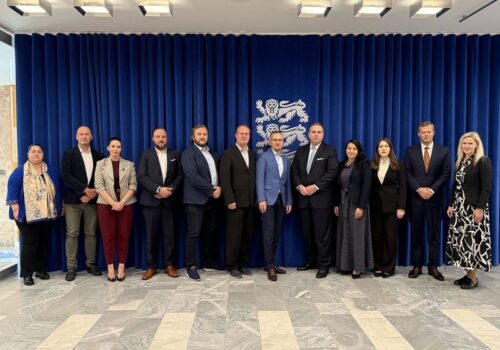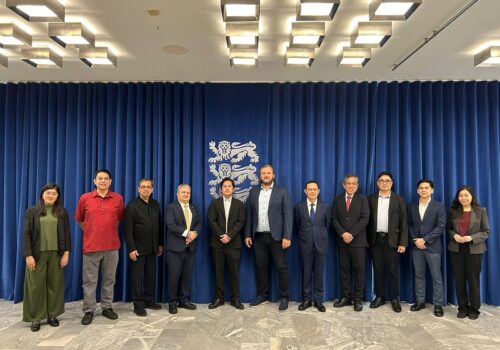Introducing Digital Trade Hub of Azerbaijan
B.EST Solutions delivering trusted e-governance is a partner in the Digital Trade Hub of Azerbaijan. A state backed e-commerce platform born out of a public-private partnership for the development of a digital infrastructure for cross-border e-trade. It connects different stakeholders – both buyers and sellers – and policy areas across sectors, borders and institutions, making it easy to move goods between countries.
Link to Digital Trade Hub of Azerbaijan: https://dth.az
Leveraging Digital Trade Facilitation for Sustainable Development in Azerbaijan
Benefitting from the opportunities of global value chains is predicated on states’ continuous pursuit of trade facilitation. From the simplification of bureaucratic trade procedures to their digitalisation, trade facilitation efforts aim to reduce the time and costs of cross-border transactions. Beyond enhancing the global economy, this helps increase national trade competitiveness and support sustainable development.
In recognition of the ever-evolving challenges and opportunities in the field, Mrs. Sabina Gurbanova – Head of the Project Management Office at B.EST Solutions – recently completed the United Nations ESCAP-ARTNET-ITD Course on Trade Facilitation for Sustainable Development. The 7-week course provided an opportunity for capacity building in the use and implementation of trade facilitation instruments and measures.
Putting theory to practice, Mrs. Gurbanova compiled a National Trade Repository (NTR) assessment report. The findings from the analysis highlight the potential value of implementing further digital trade facilitation measures to support economic growth in Azerbaijan.
Trade facilitation and the role of digitalisation
The past decades have seen an increasing recognition of the importance of trade facilitation on a national, regional and global level. Illustrating the wide reach of the trade facilitation term, the UN Global Report on Digital and Sustainable Trade Facilitation differentiates between four different areas of development:
- General Trade Facilitation – implementation of selected regulatory measures under the Trade Facilitation Agreement;
- Digital Trade Facilitation – implementation of innovative technological solutions to enable the use and exchange of electronic trade data and documents;
- Sustainable Trade Facilitation – trade facilitation for SMEs, agricultural sector and women;
- Trade Finance – enabling the flow of data, documents, and money from buyer to seller and mitigating associated risks to facilitate flow of goods.
The UN report also notes that recent studies show how most of the success in trade cost reductions have thus far been achieved through eliminating or lowering tariffs. Looking forward, this indicates that further reductions should be achieved through non-tariff sources of cost, such as time-consuming regulatory procedures and documentation.
Shifting the focus from tariff to non-tariff sources of cost reduction creates even more space for digital innovation to take hold. When it comes to trade facilitation, digitalisation has the potential to simplify and automate procedures, which can significantly reduce time and costs.
A standard example here, is the establishment of trade facilitation portals or, in other words, National Trade Repositories (NTRs). The purpose of NTRs is to make all the necessary information on trade procedures accessible through one single source. Their establishment is a crucial steppingstone in improving the transparency and accessibility of information for traders, serving as a potential area of further digital development for many countries, including Azerbaijan.
Azerbaijan’s trade facilitation profile
Overall, Azerbaijan exemplifies significant national developments in the area of trade facilitation. “Based on the latest data from the UN Global Survey on Digital and Sustainable Trade Facilitation (updated mid-2019), Azerbaijan has achieved an overall implementation rate of general and digital trade facilitation measures of 81.72%, up from 48.39% in 2015 – as compared to less than 60% implementation for the Asia-Pacific region as a whole in 2019[1],” Mrs. Gurbanova outlines in her overview of Azerbaijan’s country profile.
“Azerbaijan is outperforming both the Asia-Pacific and East and North-East Asia region average across most categories of trade facilitation measures. It is found to have nearly fully implemented all Transparency, Formalities, Institutional measures, as well as have put in place SME-related, Transit-related, Women-related and Agriculture-related trade facilitation measures,” she continues. Furthermore, Azerbaijan has achieved implementation rates of 85.19% in paperless trade, and 50.00% in cross-border paperless trade averages in 2019.
The trade facilitation overview, however, also highlighted that as many other countries in the region, Azerbaijan has yet to enable electronic exchange and legal recognition of trade documents in full. Continuous progress must be ensured in the implementation of all sustainable trade facilitation measures, such as the electronic exchange of Sanitary and Phyto-sanitary Certificates.
Potential for implementing NTR in Azerbaijan
Mrs. Gurbanova reached a similar conclusion in her NTR report, assessing the current state of export/import information accessibility in Azerbaijan.
The recommendations presented in the NTR report focus on establishing a single portal for the provision of information on export/import related procedures, required documents, related legal documentation and provide information about the time spent on each procedure. In the report, Mrs. Gurbanova mentioned that the best platform for the NTR can be provided by the Digital Trade Hub of Azerbaijan (DTH).
The DTH of Azerbaijan is an all-in-one e-trade and e-commerce portal guaranteed by the government. It offers a wide range of useful e-services including m-Residency, online company registration, issuance of a virtual address, opening online bank accounts, issuance of free sales certificates and much more. The DTH was put in place to simplify everything related to international export by digitalising and automating all paperwork and payments as well as eliminating bureaucracy.
Building the NTR based on the DTH provides an efficient and cost-cutting way forward in Azerbaijan’s digital trade facilitation efforts.
Establishing an NTR will promote the development of the economy, facilitate the process of import/export in the country as well as give an opportunity for further analysis and improvement of all processes related to trade.
The reduction of trade costs can make or break a country’s integration with regional and global value chains. In order to maximise trade as a driver of growth and sustainable development, it is therefore crucial for countries to recognise and pursue the most valuable areas of change.
[1] More detailed information about Asia-Pacific Report on Digital and Sustainable Trade Facilitation, available at: https://www.unescap.org/resources/digital-and-sustainable-trade-facilitation-report-asia-pacific-2019
[1] More detailed information about Asia-Pacific Report on Digital and Sustainable Trade Facilitation, available at: https://www.unescap.org/resources/digital-and-sustainable-trade-facilitation-report-asia-pacific-2019





